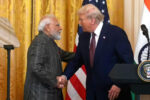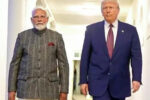Amidst recent setbacks, Boeing is poised to benefit from trade deals orchestrated by US President Donald Trump. These agreements are expected to generate new aircraft orders, potentially aiding Boeing’s recovery. However, experts question the extent of Trump’s influence, suggesting that many orders would have materialized regardless.
Boeing Soars Through Turbulence: A Trade War Tailwind?
For Boeing, the skies haven’t exactly been clear blue these past few years. From the 737 MAX crashes that shook public trust to the ongoing supply chain snags that plague the entire aviation industry, it feels like they’ve been battling headwinds at every turn. Yet, peering through the storm clouds, a rather unexpected benefactor might be helping them stay aloft: Donald Trump’s trade war.
It’s a complex picture, to say the least. While geopolitical tensions rarely translate to simple wins, the shifting sands of international trade have carved out some surprisingly favorable terrain for the American aerospace giant.
The Airbus Advantage Takes a Hit
For years, Airbus has enjoyed considerable success, partly fueled by its strong relationships with European governments and its ability to secure major orders, particularly from China. The Chinese market, a behemoth of potential growth, has been a crucial battleground for dominance in the aviation sector. Trade disputes, however, have thrown a wrench into this well-oiled machine.
As tensions between the U.S. and China escalated, Beijing found itself in a tricky position. Slapping tariffs on Boeing aircraft, a high-profile American export, would be a direct and visible response. However, outright rejection of Boeing would mean leaving massive demand for air travel unaddressed. Instead, the pendulum has swung, albeit subtly, towards rebalancing the market. Orders to Airbus have perhaps not dried up entirely, but the pace of new agreements appears to have slowed, opening a window of opportunity for Boeing.

Boeing’s Strategic Positioning
Boeing’s strength lies not just in its engineering prowess, but also in its strategic positioning within the American economy. It’s a major employer, a vital contributor to the nation’s export figures, and a symbol of American innovation. This makes it politically difficult to ignore, even amidst trade disputes.
Furthermore, Boeing has actively worked to maintain relationships across the globe. While tariffs might create friction, the underlying need for aircraft remains constant. The company’s adaptability and focus on building relationships in a complex global landscape plays a significant role in its sustained success. You can read more about Boeing’s innovation strategy on our site.
Shifting Supply Chains and the Ripple Effect
The trade war’s impact extends beyond just direct aircraft orders. It has also spurred a re-evaluation of global supply chains. Companies are actively seeking to diversify their sourcing to mitigate risks associated with tariffs and geopolitical instability. This could inadvertently benefit Boeing, as manufacturers explore alternative suppliers, potentially creating new partnerships and opportunities for the company.
However, let’s not paint too rosy a picture. Supply chain disruptions have impacted everyone, Boeing included. From raw materials to specialized components, the aviation industry is still grappling with bottlenecks and delays. The potential benefits from a reshaped trade landscape are playing out against the backdrop of this very real and ongoing challenge.
Navigating Regulatory Turbulence
Beyond the trade war and supply chain chaos, Boeing continues to navigate the stringent regulatory environment, particularly in the wake of the 737 MAX crisis. Regaining the trust of both passengers and regulators is paramount, and the company has invested heavily in safety improvements and transparency. This commitment to safety, while essential, also adds to the cost and complexity of aircraft production. However, a safer fleet ultimately benefits all stakeholders, including Boeing.
The Long-Term Outlook
The question remains: can Boeing truly capitalize on these shifting trade winds? The answer is nuanced. The trade war has undoubtedly created opportunities, but sustained success depends on factors far beyond political maneuvering. Boeing must continue to innovate, address its supply chain vulnerabilities, and, above all, prioritize safety.
While unexpected geopolitical forces have provided some lift, Boeing’s future trajectory ultimately relies on its own ability to navigate the challenges and capitalize on the ever-evolving landscape of the global aviation market. The company’s commitment to quality, safety, and innovation will be the true determinants of its long-term success.







